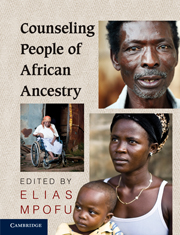Book contents
- Frontmatter
- Contents
- Contributors
- About the Editor
- Editorial Board
- Foreword
- Preface
- Acknowledgments
- PART 1 FOUNDATIONS OF COUNSELING IN AFRICAN SETTINGS
- PART 2 CONTEXTS OF COUNSELING
- PART 3 COUNSELING APPLICATIONS
- 15 Counseling for Trauma
- 16 HIV and AIDS Counseling
- 17 Substance Use Disorder Counseling
- 18 Career Counseling People of African Ancestry
- 19 Counseling People with Disabilities
- PART 4 THE FUTURE OF COUNSELING IN AFRICAN HERITAGE SETTINGS
- Counseling People of African Ancestry Multiple Choice Answers
- Index
16 - HIV and AIDS Counseling
Published online by Cambridge University Press: 05 August 2011
- Frontmatter
- Contents
- Contributors
- About the Editor
- Editorial Board
- Foreword
- Preface
- Acknowledgments
- PART 1 FOUNDATIONS OF COUNSELING IN AFRICAN SETTINGS
- PART 2 CONTEXTS OF COUNSELING
- PART 3 COUNSELING APPLICATIONS
- 15 Counseling for Trauma
- 16 HIV and AIDS Counseling
- 17 Substance Use Disorder Counseling
- 18 Career Counseling People of African Ancestry
- 19 Counseling People with Disabilities
- PART 4 THE FUTURE OF COUNSELING IN AFRICAN HERITAGE SETTINGS
- Counseling People of African Ancestry Multiple Choice Answers
- Index
Summary
OVERVIEW. All African countries and communities currently face the challenge of dealing effectively with the HIV and AIDS pandemic. Despite countless efforts and initiatives to support communities in dealing with this challenge, African communities often are characterized by a lack of sufficient services and outside support. This chapter provides an overview of typical ways of counseling people infected with and affected by HIV and AIDS in the African context. The role of community-based resources, including governmental and nongovernmental organizations (NGOs), is surveyed. HIV and AIDS counseling roles that go beyond voluntary testing and counseling (VTC) are explained, such as the provision of support to vulnerable individuals, families, and communities. The chapter also highlights a variety of formal and informal actors who potentially may fulfill a counseling role; these include teachers, nurses, family members, spiritual leaders, village chiefs, and people in other helping professions. An overview of leading themes in HIV and AIDS research is presented, including typical practices in HIV and AIDS counseling in the African context.
LEARNING OBJECTIVES
By the end of the chapter, the reader should be able to:
Outline the counseling needs of those infected with and affected by HIV and AIDS in the sub-Saharan African context.
Compare and contrast traditional and contemporary responses to the HIV and AIDS pandemic, with specific reference to African communities.
Explain the extent and nature of support required by people living with HIV and AIDS.
[…]
- Type
- Chapter
- Information
- Counseling People of African Ancestry , pp. 249 - 264Publisher: Cambridge University PressPrint publication year: 2011
- 1
- Cited by

